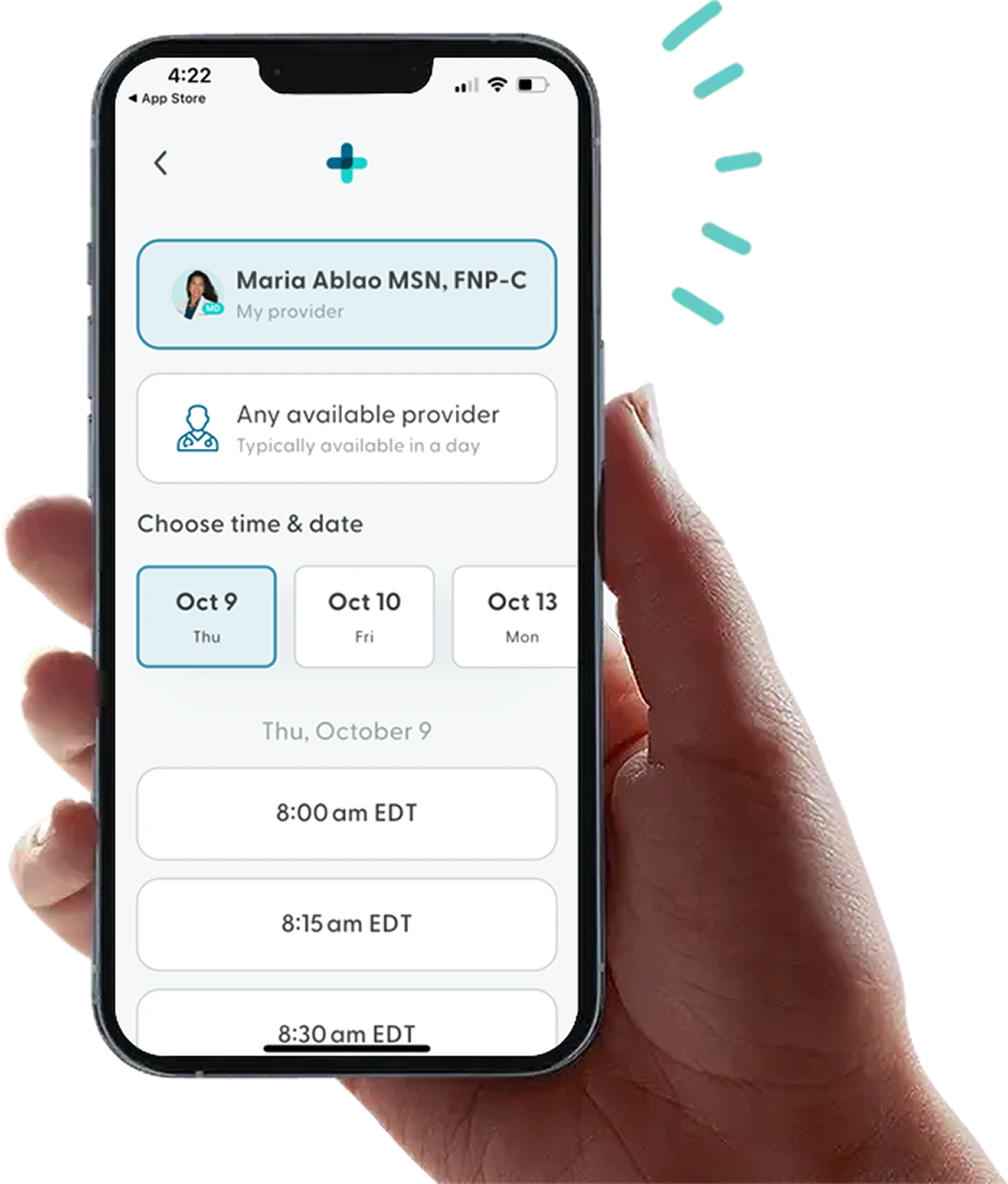How to Manage the Side Effects of Sleep Medications
There’s nothing like getting a good night’s rest after a long day. You wake up feeling rejuvenated and with the energy needed to take on your day. Various factors, including pregnancy, traumatic life events, and mental health conditions, can lead to short-term problems with falling asleep.
However, not getting enough sleep may cause other symptoms to develop beyond drowsiness. For example, lack of sleep can increase anxiety, reduce alertness, and weaken your immune system. Fortunately, sleep medications can help you get the rest you need if changing everyday habits doesn’t help with mild to moderate sleep issues.
Popular sleep medications like Ramelteon (Rozerem) and Doxepin (Silenor) can alter chemicals in the brain to help you fall asleep faster. However, some of these medications may lead to side effects like nausea, dizziness, and confusion.
Tired of restless nights?
Don’t let insomnia hold you back. Take the first step towards better sleep with LifeMD.


What are the Most Common Sleep Medications?
Fortunately, sleep medications are widely available over-the-counter (OTC) and online to treat insomnia and other mild to moderate sleep problems. Like allergy medications, OTC sleep medications contain antihistamines to help with short-term sleep issues. However, the body can get used to antihistamines over time and become less effective.
While the following medications may help with short-term sleep problems, they may be less useful over time:
Diphenhydramine (Benadryl)
Doxylamine (Unisom)
Hypnotics are the most commonly prescribed sleep medications. Hypnotics like Ramelteon stimulate receptors in the brain to help the body fall asleep. If you are experiencing persistent sleep problems, a licensed healthcare provider may prescribe you one of the following hypnotics to help with falling asleep long-term:
Ramelteon (Rozerem)
Eszopiclone (Lunesta)
Zolpidem (Ambien)
Zaleplon (Sonata)
Antidepressants can help you fall asleep. A healthcare provider may recommend taking the following medications at bedtime to increase drowsiness before falling asleep:
Doxepin (Silenor)
Trazodone (Desyrel)
While many of these medications help you fall asleep, not all of them may be ideal for helping you stay asleep. It’s recommended to make your sleep environment as comfortable as possible to ensure you stay asleep.
What is the Proper Dosage for Sleep Medications?
Your healthcare provider may recommend varying dosages based on your health history and the severity of your symptoms. When taking hypnotics for sleep, eating a big meal before taking them may delay how well your body absorbs the medication. It's important to follow dosage recommendations from a licensed healthcare provider based on your personalized treatment plan.
What are the Common Side Effects of Sleep Medications?
You may experience side effects that affect how efficiently you can complete daily tasks while taking sleep medications. Consider exercising caution in the first few days of starting a sleep medication.
Medications like ramelteon and doxepin may lead to the following side effects:
Daytime drowsiness
Confusion
Mood swings
Trouble focusing
Dizziness
Diarrhea
Be sure to reach out to a healthcare provider if you experience the following severe side effects:
Suicidal ideation
Depression
Memory loss
Sleep walking
Hallucinations
Swelling
Low libido
Nausea
The risk of severe side effects increases the longer you take the medications. Those taking higher dosages of sleep medications may also experience more side effects. Typically, a healthcare provider will start you on a lower dosage to reduce the risk of side effects.
Key Point: What are the Short Term and Long Term Side Effects of Sleep Medications?
The short-term and long-term side effects of sleep medications vary from person to person. Some people may experience drowsiness for a short period of time or have mood swings and other symptoms while taking the medication. Be sure to let a healthcare provider know if you are experiencing symptoms that get in the way of everyday life while taking the medication.
Tips for Managing the Side Effects of Sleep Medications
If possible, cut back on activities that require a lot of focus and concentration when starting sleep medications. For example, try to avoid operating large machinery or driving long distances as your body adjusts to changes in your sleep-wake cycle as a result of the medication.
How to manage drowsiness with sleep medication side effects
Drowsiness is a common short-term side effect of sleep medication. Drinking alcohol may increase drowsiness while taking sleep medications. Try to limit your intake of alcoholic drinks and any other substances that increase drowsiness while taking sleep medications.
How to manage dizziness with sleep medication side effects
If you feel like the room is spinning after taking a sleep medication, be sure to avoid doing complex tasks. Be sure to let your healthcare provider know if you experience dizziness after taking sleep medications.
How to manage gastrointestinal complications with sleep medication side effects
Gastrointestinal symptoms from sleep medication may lead to waking up in the middle of the night to go to the bathroom. Gastrointestinal symptoms like diarrhea, abdominal pain, and constipation are common side effects of sleep medications.
What are the Risks of Taking Sleep Medications?
Following your healthcare provider’s instructions when taking sleeping medications is important. Taking more sleeping pills than the recommended dosage or for a longer period of time can increase your risk of side effects. Health experts do not recommend taking sleep medications daily.
There is a risk of becoming addicted to sleeping pills. The United States Drug Enforcement Administration (DEA) classifies hypnotics, opioids, sedatives, and stimulants as controlled substances — medications with an increased risk of misuse. Be sure to let your healthcare provider know if you show signs of becoming addicted to the medication. They can help you adjust and potentially recommend an alternate medication.
Do Sleeping Pills Interact with Other Medications?
Be sure to let your healthcare provider know if you are taking other drugs before starting sleep medications. Sleep medications may interact with the following:
Cimetidine (Tagamet)
Fungal infection medication
Certain vitamins and supplements may also interact with sleep medications. Taking CBD (cannabidiol) gummies may help with falling asleep. CBD alters serotonin in the brain to create a calming effect for the body. However, taking CBD gummies with sleep medications may lead to breathing problems.
Who Should Not Take Sleep Medications?
Older adults over the age of 65 are more likely to experience insomnia and side effects while taking sleep medications. It’s also possible to become dependent on hypnotics. If you have a history of addiction, be sure to be honest with your provider before starting the medication.
A healthcare provider may recommend different medications for more severe sleep disorders like sleep apnea than they would for insomnia. If common sleep medications are not helping you fall asleep, a healthcare provider may recommend increasing your dosage or evaluating you for a severe sleep disorder.
Health experts do not recommend taking medications as the first line of treatment for helping with sleep problems. Consider setting a consistent sleep schedule, limiting screen time before bed, and incorporating other methods to improve your sleep before consulting a healthcare provider about sleep medication.
Alternatives for Better Sleep Besides Sleep Medication
It may not always be immediately clear what’s making it more difficult to fall asleep. Before prescribing medications, a healthcare provider may recommend trying the following healthy habits to improve your sleep hygiene:
Stay off your phone right before bed.
Set a reminder to go to bed at the same time every day.
Engage in relaxing activities right before going to bed.
Listen to soothing sounds or music.
Meditate before going to bed.
Avoid consuming caffeine after noon.
Practice breathing exercises before bed.
Melatonin supplements may also help you fall asleep. However, it’s important to speak with your healthcare provider before taking any vitamins or supplements. Cognitive behavioral therapy is often recommended in conjunction with sleep medication. A licensed therapist can provide you with exercises to help you stay asleep at night.
How Can LifeMD Help?
At LifeMD, we want to help you feel more energetic and lively throughout your day with easy access to licensed healthcare professionals and prescription medication online.
A LifeMD-affiliated healthcare provider can prescribe medications like ramelteon, doxepin, and trazodone to help improve sleep quality. If approved, medication can be sent directly to your home or your local pharmacy.
Get started today by completing a short assessment to help a licensed healthcare provider determine your eligibility.
More articles like this
Feel better with LifeMD.
Your doctor is online and ready to see you.
Join LifeMD for seamless, personalized care — combining expert medical guidance, convenient prescriptions, and 24/7 virtual access to urgent and primary care.

 Medically reviewed and edited by
Medically reviewed and edited by 






